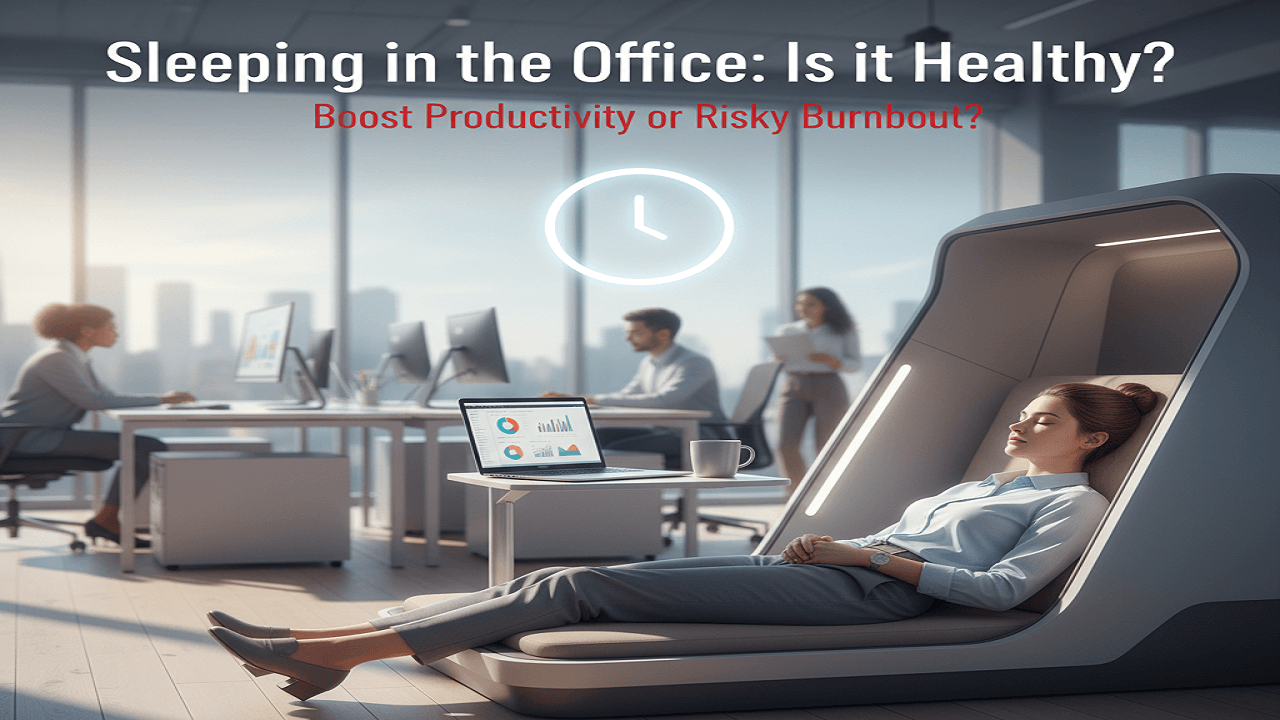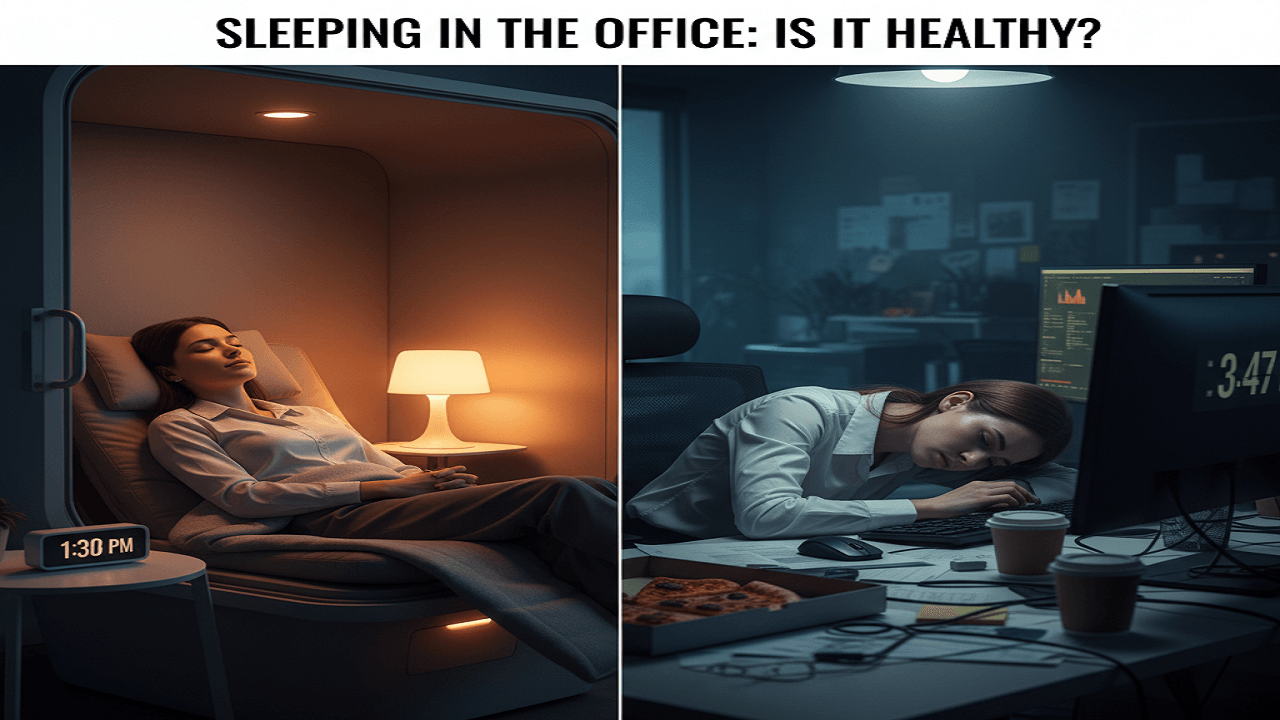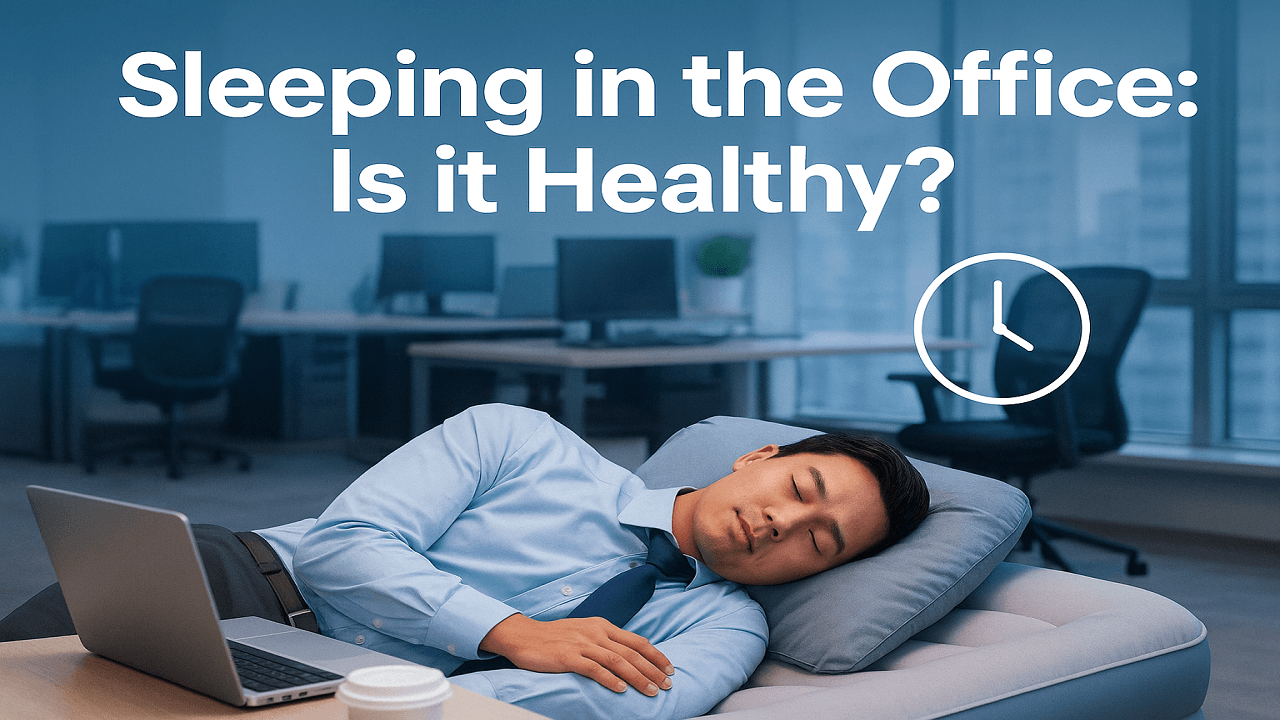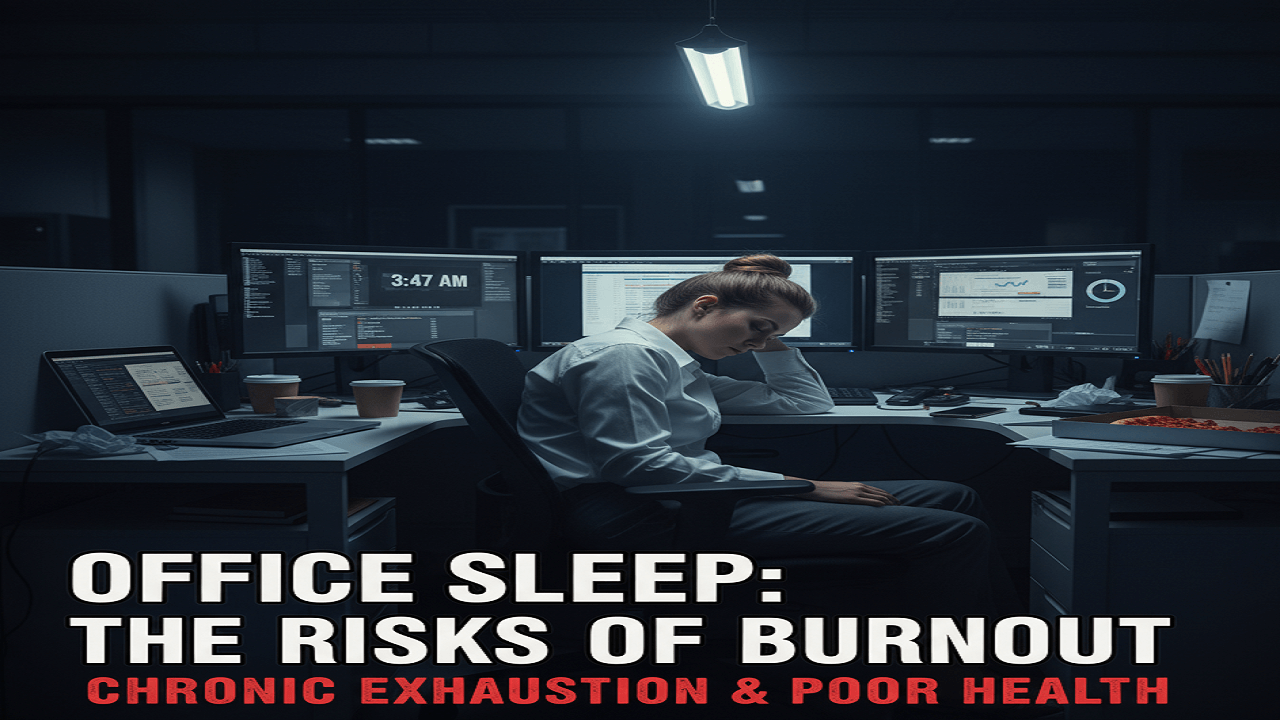
For some, sleeping in the office is a practical way to save time, boost productivity, and avoid long commutes. After all, an extra hour of rest on-site can mean a fresher mind and more output. Companies like Google, Nike, and Mercedes-Benz have even introduced nap pods and designated rest zones to encourage short naps during work hours.
However, while sleeping at work may sound efficient, it raises an important question: Is sleeping in the office healthy? Could spending nights under fluorescent lights and behind computer screens affect productivity and your physical and mental well-being?
This comprehensive guide explores the pros and cons of sleeping in the office, the growing global trend behind it, and whether turning your workspace into a bedroom helps or harms your overall health. You’ll also find practical tips for maintaining good sleep hygiene and my personal insights.
Table of contents
💤 The Rise of Office Sleep Culture and Nap Pods
In recent years, sleeping in the office has evolved from an occasional emergency measure into a workplace trend embraced by global corporations. As work-life boundaries blur, companies realize that employee rest isn’t a distraction but an investment in performance and mental clarity.
How Sleep Pods Redefined Workplace Rest
Integrating sleep into the workplace began with the tech industry, where innovation often demands long hours and creative stamina. Major companies like Google, Nike, and Zappos have introduced nap pods and rest areas that allow employees to recharge during the day. These futuristic capsules, designed for quick naps, offer privacy, noise reduction, and even soothing ambient sounds to help workers recover energy without leaving the office.
At Twitter’s San Francisco headquarters, reports of employees sleeping on office floors went viral, leading management to repurpose unused rooms into temporary sleeping spaces. Similarly, other corporations followed suit, seeing rest as a productivity enhancer rather than wasted time.
Why the Trend Is Spreading Globally
In regions like China and Japan, sleeping at work — sometimes called inemuri — has long been seen as a sign of dedication. Many factory and tech workers rest in office bunk beds or cots between shifts to avoid long commutes and meet tight production deadlines. During COVID-19 lockdowns, this habit intensified as companies adapted sleeping quarters within workplaces to keep operations running.
Even in the United States, where overwork is often a badge of honor, professionals in competitive cities like New York and San Francisco are reconsidering how they rest. Long commutes, rising housing costs, and high job expectations push many to experiment with office sleep setups, aiming to balance energy and efficiency.
While this movement promises convenience and potential productivity gains, it also prompts critical reflection. Can sleeping where you work support a healthy lifestyle — or does it risk eroding the essential line between rest and labor?
💤 Why Employees Choose to Sleep at Work
The decision to sleep in the office often goes beyond convenience—it reflects the modern pressures of professional life. Rising living costs, remote work fatigue, and the relentless pace of corporate culture are pushing more employees to turn their offices into temporary resting spaces.
1. Avoiding Long and Exhausting Commutes
In large cities like Los Angeles, London, or Tokyo, commuting can easily consume two to three hours daily. For professionals with demanding schedules, that’s time lost in traffic or crowded trains instead of resting or being productive. Sleeping at work can seem like a clever workaround, allowing them to reclaim that time for sleep, exercise, or early project starts.
2. Saving on Living Expenses
With rent prices reaching record highs, especially near central business districts, some workers view sleeping in the office as a way to cut costs. Entrepreneurs, freelancers, and startup employees often sleep on air mattresses or office sofas to save money and reinvest what they spend on housing into their ventures. Even partial office stays — a few nights a week — can reduce home utility bills and monthly expenses.
3. Meeting Tight Deadlines and High Expectations
The competitive nature of many industries, especially tech, finance, and media, drives employees to prioritize results over rest. Staying overnight at the office often stems from wanting to meet deadlines, launch products on time, or impress supervisors. In such cases, sleeping at work becomes less about comfort and more about commitment.
4. Blurred Boundaries Between Work and Life
The pandemic-era shift toward remote and hybrid work blurred the line between home and office. For some, returning to physical offices didn’t restore that separation — it simply moved the problem. Professionals now work longer hours and sometimes sleep in the same place they brainstorm, code, or hold meetings.
While these motivations may appear logical in the short term, they raise more profound questions about health, productivity, and long-term sustainability. Exploring the benefits and drawbacks of sleeping in the office is essential to understand the real impact.
💤 Pros of Sleeping in the Office
While unconventional, sleeping in the office can provide surprising advantages for employees and employers. Sleeping on-site can save time, reduce stress, and even boost performance for workers facing tight schedules or long commutes. However, the benefits largely depend on balance and company culture.
1. Lower Living and Utility Costs
One of the most practical benefits of sleeping in the office is financial. Renting an apartment close to work can be expensive — especially in high-demand cities. Some employees and entrepreneurs stay in the office a few nights weekly to cut rent, electricity, and water costs.
For example, entrepreneur Alistair Vigier calculated that sleeping at his office saved him about $2,500 monthly, money he redirected toward business marketing. Even occasional overnight stays can result in notable savings on household bills and commuting expenses. Fewer nights at home mean lower heating, cooling, and entertainment costs — practical for those chasing financial goals or startup dreams.
2. Eliminating Long Commutes
Long commutes have been linked to stress, fatigue, and lower job satisfaction. According to surveys, many employees would rather do household chores than sit in traffic for hours. By sleeping in the office, workers eliminate that wasted time and arrive at their desks more energized and focused.
In cities like New York or Chicago, where employees spend an average of four full days per year commuting, cutting that time can significantly improve productivity and personal well-being. Fewer commutes mean less time spent in traffic, less exposure to pollution, and more rest overall.
3. Boosting Productivity and Performance
When used strategically, sleeping at work can actually enhance productivity. Employees who avoid the commute often use the saved time for extra rest, preparation, or planning, leading to sharper focus and better results. Studies show small sleep deficits can impair decision-making, creativity, and mood.
Some workers report being more alert and efficient during the day by incorporating short naps or occasional overnight stays. Companies offering nap pods or quiet rest areas have observed improvements in attention span and morale. When managed correctly, sleeping in the office can contribute to better overall performance.
😴 Cons of Sleeping in the Office
Although sleeping in the office can save time and money, it has serious downsides that can affect your physical health, mental well-being, and overall quality of life. Before turning your workplace into your bedroom, it’s essential to weigh these drawbacks carefully.
1. Losing Work-Life Balance
The most significant disadvantage of sleeping in the office is the erosion of work-life balance. When your workspace becomes your resting space, the line between professional and personal life disappears. Over time, this can lead to burnout, emotional exhaustion, and reduced motivation.
Research from UCLA revealed that employees who work longer hours face higher risks of heart disease, stroke, and depression. Without the physical separation of “home” and “office,” your mind never entirely disconnects from work — leaving you constantly “on call” and unable to recharge properly.
2. Limited Social Interaction
A healthy social life is essential for emotional balance and longevity. However, employees who spend nights at the office often isolate themselves from friends and family. Extended work sessions and solitary evenings replace social gatherings, hobbies, and downtime.
Studies consistently show that strong social relationships improve mental health and happiness. Skipping these connections in favor of more work may temporarily enhance productivity, but can severely harm your long-term well-being.
3. Frequent Disruptions and Lack of Privacy
Sleeping in a professional space rarely guarantees comfort or privacy, even with nap pods or office cots. Early meetings, ringing phones, and unexpected visitors can easily disturb rest. Some employees report being interrupted by colleagues or maintenance staff during overnight stays, leading to poor-quality sleep.
Practical concerns include where to shower, how to store personal items, and whether the office is secure enough for overnight stays. Without basic amenities like a bathroom or a quiet corner, getting quality sleep at work can quickly become more stressful than it’s worth.
4. Poor Sleep Hygiene and Health Risks
Healthy sleep depends on consistent habits and an environment designed for rest — something most offices don’t provide. Harsh lighting, screen exposure, background noise, and constant digital stimulation make falling and staying asleep difficult.
Poor sleep hygiene affects mood and focus and can weaken the immune system, increase stress levels, and raise the risk of chronic illnesses. No matter how modern, the office isn’t a substitute for a dark, quiet bedroom and a comfortable mattress at home.
🛋️ How to Sleep Better at Work (If You Must)
Sometimes, sleeping in the office isn’t a choice—it’s a necessity. Tight deadlines, overnight projects, or unpredictable schedules can make it unavoidable. However, if you ever find yourself in this situation, there are practical ways to make your rest healthier and more effective.
1. Create a Comfortable Sleep Setup
Comfort plays a crucial role in the quality of your rest. Instead of dozing off on your desk or a stiff chair, bring a compact air mattress, foldable cot, or sleeping pad. These options offer better spinal support and prevent waking up with body aches.
Choose a quiet and dimly lit area of the office — ideally a space with minimal foot traffic or noise. If that’s impossible, use a sleep mask and earplugs to block light and sound. The goal is to mimic the calmness of a bedroom environment, even temporarily.
2. Maintain Proper Sleep Hygiene
Good sleep hygiene doesn’t vanish just because you’re in an office. To rest well, avoid screen exposure for at least 30 minutes before lying down, as the blue light from laptops and phones interferes with melatonin production.
Try to stick to a consistent bedtime and wake-up schedule, even on days you sleep at work. Bringing a light blanket and a comfortable pillow can also make a difference. If your company allows, consider using soft white noise or pink sounds to help you relax and drift off faster.
3. Set Boundaries and Communicate
Even if your employer supports workplace rest, it’s essential to communicate clearly with your team. Let coworkers know when you’ll be unavailable or resting to avoid interruptions.
If overnight stays are rare, get permission from management in advance. While some modern offices embrace napping culture, others may find it unprofessional. If your workplace doesn’t offer dedicated nap spaces, sleeping in your car or a quiet lounge might be a more discreet option.
4. Keep It Occasional, Not Routine
Occasional rest at the office can help in emergencies, but making it a habit can harm your long-term health. The human body and mind need a proper separation between work and rest to recover fully. Sleep in the office only when necessary, and always prioritize returning home for a whole night’s rest.
🧠 Personal Insight – My Perspective on Sleeping in the Office
As someone who has worked in demanding environments where long hours and tight deadlines were the norm, I’ve experienced firsthand the temptation to sleep in the office. A strange blend of dedication and exhaustion comes with balancing productivity and well-being. Over time, I learned that while it might seem like an efficient solution, it’s not always the healthiest one.
Sleeping in the office should be a last resort, not a routine practice. I brought a compact air mattress to the office for late nights during one particularly intense project. It helped me get through critical deadlines without leaving the building. However, I quickly noticed the mental toll it took — I started constantly feeling “on,” unable to disconnect or relax truly. My work quality and focus suffered as a result.
That period taught me an essential lesson: rest and recovery are not luxuries but necessities for peak performance. While occasional naps at work can provide a short-term boost, true rejuvenation only happens when you physically and mentally step away from your workspace. Home, or even a different environment, allows your mind to reset and your body to recover properly.
If your job regularly pushes you to sleep at the office, that may be a sign of workload imbalance or burnout risk. It’s worth having an open conversation with your manager about expectations, scheduling flexibility, or workload redistribution. Modern employers increasingly know that sustainable productivity relies on rest, not endless hours.
Ultimately, I believe sleeping in the office isn’t inherently unhealthy — but it becomes so when it replaces real rest. It’s best used as a backup plan, not a lifestyle. Prioritize proper sleep whenever possible, because consistent quality rest will consistently outperform caffeine, willpower, or long hours in the long run.
🏢 How Companies Can Support Healthy Rest Practices at Work
Forward-thinking organizations increasingly recognize that well-rested employees are more productive, creative, and resilient. Instead of viewing rest as a sign of laziness, many modern companies are integrating structured sleep solutions into their workplace culture. Employers wishing to minimize burnout and support performance should take a proactive approach to healthy workplace rest.
1. Introduce Designated Nap Areas
Many tech firms and startups have implemented quiet rooms or nap pods for short breaks. These spaces help employees recharge without disrupting their workflow or workspace boundaries. Providing air mattresses, recliners, or nap pods encourages responsible rest instead of covert desk naps that reduce morale and comfort.
A well-designed rest area should include:
- Soft lighting or dimmable lamps
- Temperature control
- Clean bedding or recliners
- Sound insulation or noise machines
This environment signals that rest is intentional and supported, not frowned upon.
2. Encourage Short Power Naps Instead of Overnight Stays
Power naps — typically between 15 and 30 minutes — can improve memory, alertness, and performance without affecting nighttime sleep. Companies can normalize these short rest breaks rather than encouraging overnight stays. Allowing flexible break schedules during high-stress periods can majorly affect employee well-being.
3. Educate Teams About Sleep Health
Offering workshops or short training sessions on sleep hygiene and mental health can help employees understand the importance of rest. Topics may include ideal nap lengths, the effects of blue light, and how to separate work and relaxation time. This knowledge helps employees make healthier choices — even when deadlines are tight.
4. Model Healthy Behavior at the Leadership Level
Leaders set the tone for company culture. When managers emphasize balanced work hours, take breaks, and avoid glorifying exhaustion, employees feel empowered to do the same. A culture that values well-being over endless availability is far more sustainable. By creating a system where rest is respected, companies improve productivity, foster employee loyalty and creativity, and lower turnover rates. Supporting healthy sleep practices benefits both sides: workers stay engaged, and organizations gain consistent, high-quality output.
⚠️ Health Risks of Regularly Sleeping in the Office
While sleeping in the office can sometimes provide convenience, making it a regular habit can lead to serious health consequences. Understanding these risks is crucial for employees considering overnight or extended rest at work.
1. Physical Health Concerns
Sleeping in a non-ergonomic setup — such as chairs, sofas, or temporary cots — can cause:
- Back, neck, and shoulder pain
- Muscle stiffness and poor posture
- Increased risk of repetitive strain injuries
Over time, poor physical support can lead to chronic discomfort, affecting productivity and overall quality of life.
2. Sleep Deprivation and Cognitive Impairment
Office environments are rarely optimized for restorative sleep. Even short naps on a desk or couch are often interrupted by noise, light, or phone notifications. Regularly compromised sleep affects:
- Memory and learning
- Attention and focus
- Decision-making and creativity
Chronic sleep deprivation is also linked to impaired immune function, making employees more susceptible to illness.
3. Mental Health Implications
Blurring the line between work and rest can increase stress, anxiety, and depression. Employees who habitually sleep at work may experience:
- Persistent stress due to feeling “always on”
- Social isolation from family and friends
- Emotional exhaustion and burnout
4. Long-Term Risks
Studies show that consistently working and sleeping in the office is associated with:
- Cardiovascular issues (heart disease, hypertension)
- Metabolic disorders, including weight gain and insulin resistance
- Reduced life satisfaction and increased mortality risk
While occasional office sleep is manageable, turning the workplace into a permanent sleeping environment poses serious long-term risks. Balance and moderation are key.
🌙 Final Thoughts – Is Sleeping in the Office a Healthy Habit?
Sleeping in the office can be a practical solution for tight schedules, long commutes, or urgent deadlines. Short naps and occasional overnight stays may help boost productivity, reduce fatigue, and save money. However, the practice has significant drawbacks that affect physical health, mental well-being, and work-life balance.
Ultimately, the healthiest approach is moderation and intention. Use office sleep as a temporary aid rather than a lifestyle. Ensure your rest is comfortable, private, and supplemented by proper sleep hygiene. Whenever possible, prioritize going home to sleep on an appropriate mattress and in a restful environment.
Employers can support employees by providing nap pods, quiet spaces, and education about sleep health, but workers themselves must recognize their limits. Actual performance comes not from sleeping at your desk but consistent, quality rest combined with focused, energized work hours.
By respecting these boundaries, employees can enjoy the benefits of occasional office sleep while avoiding long-term health risks. After all, the key to success isn’t just working more — it’s resting better.
❓ FAQ – Sleeping in the Office: Is it Healthy?
1. Is it OK to sleep in the office overnight?
Occasional overnight stays are acceptable for emergencies or tight deadlines, but making it a habit can harm your physical and mental health. Proper sleep at home is always healthier.
2. What are the benefits of sleeping at work?
Short naps or temporary rest at work can boost alertness, reduce fatigue, save commuting time, and even improve productivity when done in moderation and in a quiet, comfortable space.
3. Does sleeping at work improve productivity?
Yes — short naps can enhance focus, memory, and cognitive performance. However, consistent office sleep cannot replace regular, high-quality nighttime rest at home.
4. Is it bad for health to sleep at work regularly?
Regularly sleeping in the office can lead to poor sleep hygiene, chronic fatigue, back or neck pain, stress, and burnout. Over time, it may increase the risk of cardiovascular and metabolic problems.
5. What are better alternatives to sleeping in the office?
Better options include:
- Power naps at home before or after work
- Flexible schedules to reduce long commutes
- Using designated rest areas or nap pods at work for short breaks
- Maintaining a consistent sleep routine with proper bedding and dark, quiet conditions




